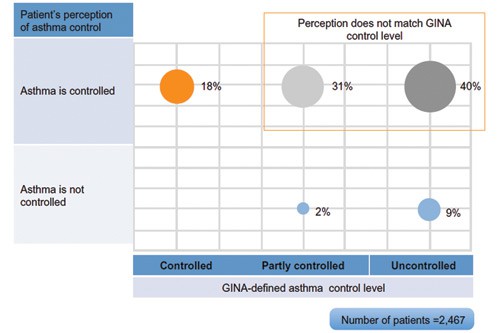
Despite the global advances made in the treatment for asthma, many studies have shown that asthma remains uncontrolled for a large proportion of patients, when assessed according to international guidelines. A comprehensive market research study has recently been conducted among patients across Asia, in order to try to understand patient perceptions of asthma control and confirms that 50% of patients are uncontrolled. Because patients lack an understanding of what control means, many patients considerably overestimate the extent to which they are successfully managing their condition.
Asthma is a global health problem affecting over 300 million people worldwide, most of them children. Although the prevalence of asthma is slightly lower in Asia than in Europe, in certain parts of Southeast Asia and the Western Pacific Region, 107 million people are said to be sufferers and this number appears to be on the rise. The treatment of asthma presents a considerable economic cost: not just directly in terms of hospitalisation, medical treatment and healthcare resources, but also indirectly from time lost from work, absenteeism from work or school, and even premature death. In 2006, annual per patient direct cost of treatment ranged from USD108 to USD1,010 and constituted about 13% of the per capita GDP of countries in the Asia-Pacific. The cost of uncontrolled asthma has been estimated to be 50% more than that of the controlled disease. If countries want to rein in the burden of caring for asthma patients, better disease management is critical.
Pharmaceutical company Mundipharma specialises in respiratory disease. One of its key aims is to find better solutions in asthma. Using the knowledge that despite advances in the treatment of asthma, many patients are still uncontrolled, it wanted to understand the patient attitudes and perceptions which might be driving this issue and so in 2012 it undertook the largest European market research study of adult asthma patients. The initiative was called REALISE – REcognise Asthma and LInk to Symptoms and Experience. In 2015, as it began to notice a rising trend of uncontrolled asthma in Asia, it asked pharmaceutical market research specialist Research Partnership to conduct a similar study in China, Hong Kong, Indonesia, Korea, Malaysia, Philippines, Singapore and Taiwan.
REALISE Asia was conducted online among 2,467 18-50 year-old adults suffering from asthma and sought to understand patients’ perception of asthma control and attitudes toward treatment. The respondents were drawn from a large online panel of people living in Asia, and selected based on whether or not they suffered from asthma and met certain data quality checks. In order to ensure that the survey design was relevant to local audiences in each market, a working group consisting of physicians and respiratory specialists were called upon to review the questionnaire and ensure it took account of the local context. A field test of the questionnaire was also carried out with ten respondents per country. The results were published in the Journal of Asthma and Allergy in late 2015.
It is worth bearing in mind that this survey was conducted online, using a large internet panel to recruit people suffering with asthma. Compared to other Asian studies utilising face-to-face or phone interviews, the lower average age and smaller female representation of respondents reflect the younger, male-predominant online population who undertook this survey. Therefore, the respondents in this study are probably more likely to be users of the internet and social media than the general Asian population. Consequently, this group may also have had better access to information about asthma management than the general population. However, despite these methodological considerations, the findings still shine a light on patient perceptions of asthma management.
Knowledge of asthma control and inhaler medication remains low
The survey found that 89% of patients believe they have their asthma under control and 81% think their level of asthma is not serious. Yet, using their reported symptoms as a means of measuring their actual asthma control, it was found that half of patients currently have uncontrolled asthma. Consequently, 40% of patients’ perception does not match the GINA (Global Initiative for Asthma) defined control level. Worryingly, 38% of patients said they had visited the emergency department in the past year and 33.1% reported having been hospitalised for asthma in the past year. Over three-quarters required one or more courses of antibiotics to treat health problems related to their asthma and almost three-quarters had one or more course of corticosteroids. Two-thirds had to miss work because of their asthma.
When asked about their view of asthma control around two-thirds said it meant managing attacks, either by controlling them with medical help, reducing the number of attacks, preventing attacks through medicine or avoidance of triggers. A quarter saw it as an absence of or minimal symptoms.
These findings highlight the fact that asthma management in Asia is crisis-related rather than preventative. Patients define asthma control as being able to manage or relieve the exacerbations or attacks instead of preventing them. This was seen in the way they understood the concept of asthma control and reflected in their medication usage – reliever users outnumbered controller users by 2 to 1. There appears to be a disparity around the definition and understanding of the word control and more work needs to be done around the language of asthma to enable patients to understand what control means. The perception of control needs to shift from relief to prevention.

One problem area seems to be with regards to the use of inhalers. Patients are required to use controller inhalers regularly in order to prevent an attack. Relief inhalers are used once an attack is underway. Yet many patients can’t identify which of their inhalers is for controlling their asthma. The study revealed that only 20% could identify their medication. Patients are reluctant to use their inhalers because either they find them a nuisance or they don’t want to be viewed by others as being ‘sick’. Addressing some of these issues, around both inhaler use and inhaler perceptions, could help to improve treatment adherence and therefore improve disease management. Patients who did correctly identify their inhaler medication and had used it demonstrated better asthma control.
An opportunity also exists to better educate asthma patients. In this study, a large majority (90%) were found to actively seek information on managing their condition, using mostly online sources (43%) and healthcare professionals (38%), but their knowledge of asthma control and inhaler medication remains low. Healthcare professionals are well placed to help patients with disease management and are a trusted source, according to patients completing this study.
The internet also provides a great opportunity to augment the delivery of information through channels such as search engines, health-related websites and health forums. Social media channels remain a much under-utilised resource – a quick scan of the term ‘asthma’ and ‘asthma inhaler use’ in YouTube returns no results in the top 100 videos from pharmaceutical companies. Clearer information about what control is and should look like using language which is meaningful to patients could be presented using these types of channels in order to help bring about a change in patient perception and ultimately, behaviour.
This article has been reproduced from published research which appeared in the Journal of Asthma and Allergy, vol 8, pp. 93-103, titled ‘Time for a new language for asthma control: Results from REALISE Asia’, authored by Price D, et al. 2015
Market research was conducted by Research Partnership Pte Ltd and performed by Pei-Li The, Rachel Howard, Tsin-Li Chua and Jie Sun on behalf of Mundipharma




